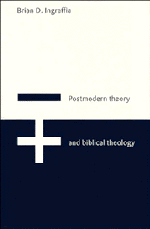Book contents
- Frontmatter
- Contents
- Acknowledgements
- List of abbreviations
- Note on translations of the Bible
- Introduction: postmodernism, ontotheology, and Christianity
- 1 NIETZSCHE'S MOCKERY: THE REJECTION OF TRANSCENDENCE
- II HEIDEGGER'S FORGETTING: THE SECULARIZATION OF BIBLICAL ANTHROPOLOGY
- 6 From the death of God to the forgetting of Being
- 7 Heidegger's theological origins: from biblical theology no to fundamental ontology
- 8 The redemptive–eschatological separation of flesh and Spirit in the epistles of the Apostle Paul
- 9 Inauthenticity and the flesh
- 10 The eigentlich Selbst or the pneumatikos anthropos
- III DERRIDA'S DENIALS: THE DECONSTRUCTION OF ONTOTHEOLOGY
- Conclusion: ontotheology, negative theology, and the theology of the cross
- Notes
- Bibliography
- Index
7 - Heidegger's theological origins: from biblical theology no to fundamental ontology
Published online by Cambridge University Press: 01 June 2011
- Frontmatter
- Contents
- Acknowledgements
- List of abbreviations
- Note on translations of the Bible
- Introduction: postmodernism, ontotheology, and Christianity
- 1 NIETZSCHE'S MOCKERY: THE REJECTION OF TRANSCENDENCE
- II HEIDEGGER'S FORGETTING: THE SECULARIZATION OF BIBLICAL ANTHROPOLOGY
- 6 From the death of God to the forgetting of Being
- 7 Heidegger's theological origins: from biblical theology no to fundamental ontology
- 8 The redemptive–eschatological separation of flesh and Spirit in the epistles of the Apostle Paul
- 9 Inauthenticity and the flesh
- 10 The eigentlich Selbst or the pneumatikos anthropos
- III DERRIDA'S DENIALS: THE DECONSTRUCTION OF ONTOTHEOLOGY
- Conclusion: ontotheology, negative theology, and the theology of the cross
- Notes
- Bibliography
- Index
Summary
I am a Christian theo-logian.
Heidegger, letter to Karl Löwith (1921)Without this theological background [origin] I should never have come upon the path of thinking. But origin always comes to meet us from the future.
Heidegger, “A Dialogue on Language” (1959)I will be focusing in the following chapters on a comparison and contrast between Heidegger's analysis of Dasein and Paul's Christian anthropology. I am less interested in proving that Christian anthropology was a “source” for Heidegger's hermeneutic of Dasein than I am in analyzing the ways in which Pauline concepts undergo a modification when they resurface in Being and Time. Ultimately I will contrast Heidegger's “godless” (gott-lose) analysis of Dasein (ID 72), which insists that we must first develop an adequate understanding of human existence before considering the question of God, with the biblical understanding of humanity, which insists that we must begin with the divine/human relationship in order to understand human existence.
There has recently been a renewed interest in the “young Heidegger” as a result of the publication of Heidegger's early Freiburg lectures in the Gesamtausgabe. There have also been new biographical studies of the young Heidegger resulting from the renewal of the controversy over Heidegger's involvement in National Socialism. I will be drawing upon this new research on the early Heidegger in order to reopen the debate concerning the relationship between Heidegger's fundamental ontology, especially his Dasein-analysis, and Christian theology, especially biblical anthropology.
- Type
- Chapter
- Information
- Postmodern Theory and Biblical TheologyVanquishing God's Shadow, pp. 110 - 122Publisher: Cambridge University PressPrint publication year: 1995



